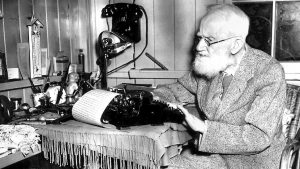Introduction to George Bernard Shaw’s life

George Bernard Shaw was an Irish playwright who was born in Dublin, in 1856. Shaw grew up in an atmosphere of genteel poverty, which was more humiliating than being merely poor. He was first tutored by a clerical uncle, because he basically rejected the schools he then attended; by age 16 he was working in a land agent’s office. This was because he greatly disliked the system of corporal punishment and the formalised education system that prevailed during that time.
Shaw’s Writing Career
After working as a clerk in Dublin for several years, in 1876, Shaw left for London to join his mother who was living there. In London, he began reading extensively and writing his first novels. He also became increasingly devoted to the ideals of socialism. He joined the Fabian society and became one of its leading writers and activists, inspiring and helping activists such as Annie Besant. With fellow Fabians such as Sidney and Beatrice Webb, he helped found the London School of Economics (LSE) after receiving private bequests. In 1898 he married Charlotte Payne Townshend, a fellow Irish Fabian. The marriage was never consummated and they remained childless. In 1906, they moved to Ayot St Lawrence in Hertfordshire, where they lived for the remainder of their lives. By the 1890s, his plays were being performed in London and the income from them enabled him to devote his life to writing. Shaw wrote that he was influenced by Henrik Ibsen who helped pioneer more realistic modern drama and infused his plays with his concepts of social justice and issues of class. One of his best known plays Pygmalion, which was later made into a film and musical My Fair Lady, which deals with the class divide which characterised British society at the time. Alon with plays, he wrote novels, short stories and was a noted literary critic. In particular, he was influential in criticising the Victorian preference for performing edited Shakespeare plays. By the start of the First World War, Shaw was a well-known playwright. One of his most critically acclaimed plays was Saint Joan (1923) about the life of Joan of Arc. This play contributed towards his reception of the Nobel Prize in Literature 1925, which he ultimately rejected. Shaw was also a proponent of the theory of Eugenics, a supporter of vegetarianism and sympathetic to Irish home rule. He was not a formal member of any religion. Most of all, Shaw is best remembered for his iconic wit and biting satire, which was social and political commentary. He is one of the most quoted authors and are frequently mentioned. His wit led to the creation of an adjective “Shavian” to describe a Shaw like witticism.